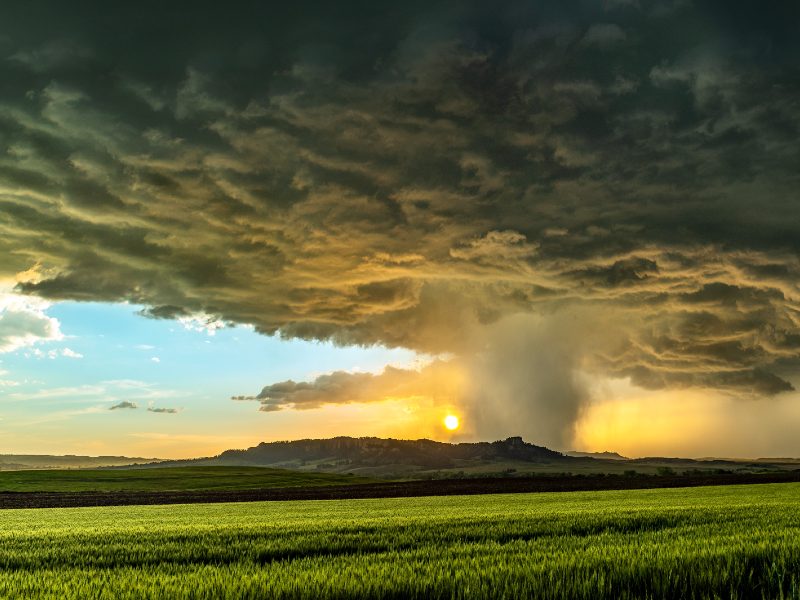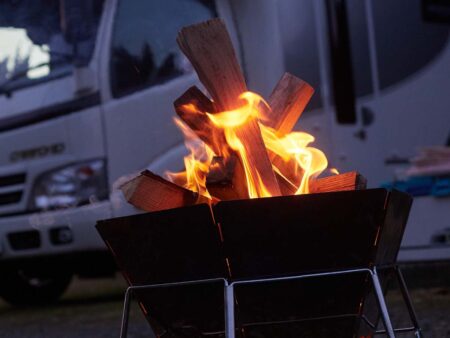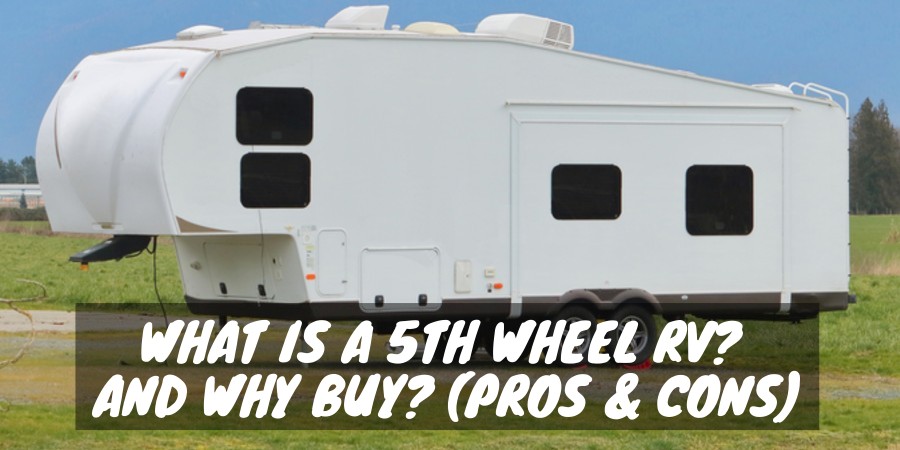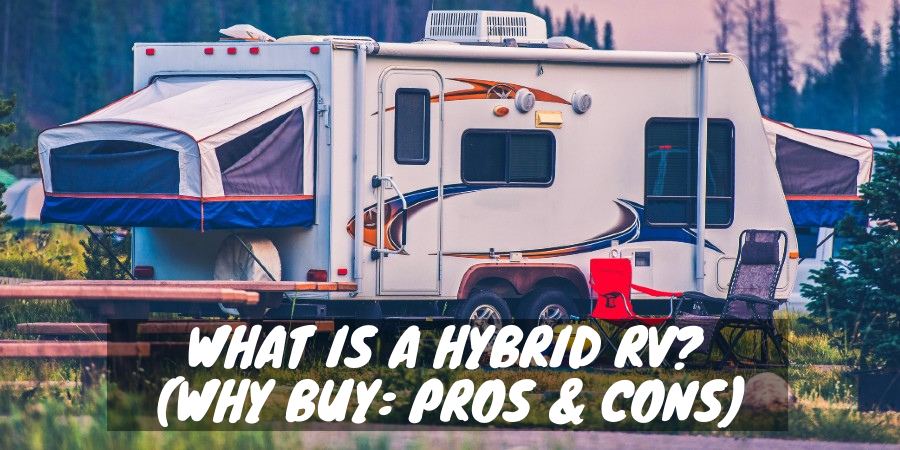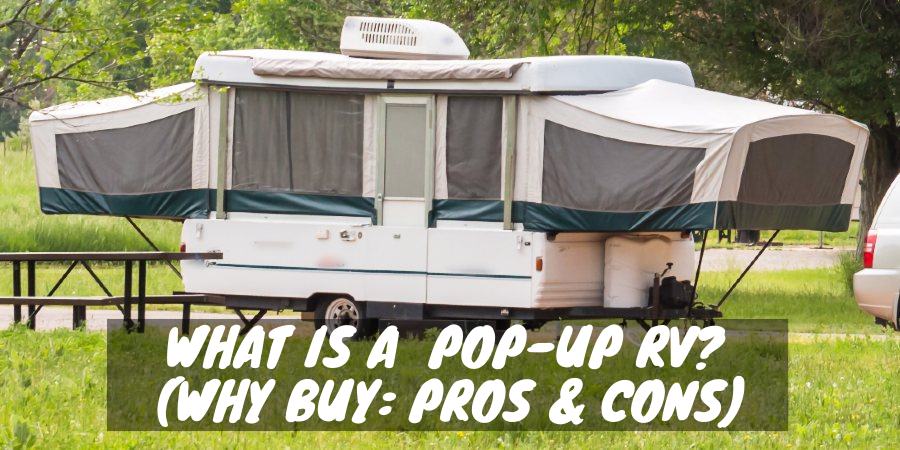If you love to RV or are part of the full-time RVing community, you know severe weather events can be scary when you’re on the road. High winds from tornadoes can quickly flip over a camper or tear it into pieces.
The National Oceanic and Atmospheric Administration (NOAA) states the US has around 1,200 tornadoes yearly. Luckily, modern Doppler radar helps spot tornado formations so they can alert residents to prepare.
Knowing how to protect yourself and your recreational vehicle from tornadoes while camping is especially concerning because there is typically only a three to 30-minute warning when one is about to strike. Trying to outrun a tornado can put you in even more danger, so the best action for RVers is to learn tornado safety.
When you prioritize learning how to prepare for a tornado or high-wind event while camping, you’ll be ready to keep your RV and occupants safe.
Purchase a Weather Radio and Download a Weather Alert App
Weather Radio
Access to real-time weather events can ease stress because you aren’t left wondering if you’re in a tornado’s or severe storm’s path, and early knowledge can mean the difference between getting your RV and camping guests to a safe place.
An NOAA Weather Radio (or NOAA Weather Radio All Hazards) is a 24-hour network of VHF FM weather radio stations across the US that automatically broadcast weather info from the nearest National Weather Service office.
I suggest the ETR Emergency Solar Radio, which has a 7 NOAA weather band alert, AM and FM, two light options, and can charge using the hand crank, through the built-in solar panel, or via a micro USB port. When bad weather knocks out the power, having continual access to weather updates is a lifesaver.
- [Life Saver Weather Radio in Emergency]Weather was unsettled, so we…
- [8000mAh Battery Capacity]Built-in upgraded 8000 rechargeable battery,…
- [3+1 Lighting Mode]Bright light and Loud SOS alarm are the most…
- [3 Power Supply]Hazard weather always lead to power outages and you…
- [What You Get]With the wrist strap and compass, the IPX3 waterproof…
A radio that can function without shore power is critical, as cell phone signals can fail during bad weather and leave you without the notifications you require to stay safe.
Best Weather Apps for RVers
Having weather alerts sent directly to your mobile phone is convenient and can buy you precious minutes if a tornado is likely to strike your area. However, I suggest you download several apps to guarantee you get the proper real-time alerts.
The apps most expert RVers rely on for tornado warnings are:
Storm Shield
This app focuses on alerts for tornadoes and flooding in your area and often triggers a warning before regional authorities set off tornado sirens.
NOAA Weather Radar Live
This app provides a highly accurate radar so you can watch where storms are tracked and see the severity of winds and rainfall.
MyRADAR Weather Radar
MyRadar is another top-quality app for tornadoes and all weather events that can alter your RVing plans. The app is easy to navigate and delivers accurate, real-time storm tracking.
WINDY
This app provides current and future predictions of wind speed and direction so you can know when it’s wise to pull off the interstate, move your RV at the campsite, or bring in your awning and patio furniture. This app is excellent for daily RV life.
Create a Tornado and Severe Weather Plan
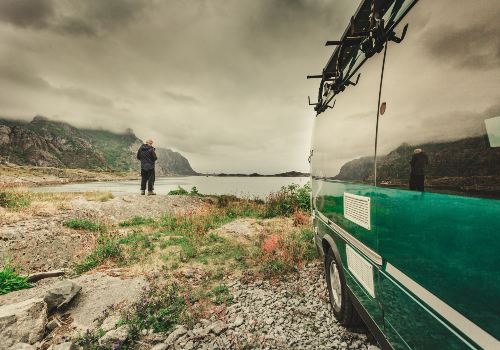
RVing is most popular in the spring and summer when severe storms that can spawn tornadoes are most likely to occur. The risk increases if your camping plans are in the Midwest or Southeastern US, areas that have the highest number of tornadoes each year.
However, a tornado or straight-line winds can happen during any season. While predicting when and where a tornado will occur is impossible, having an emergency plan will let everyone quickly react when they receive a severe weather alert instead of panicking.
Here is a checklist of things to add to your RV tornado plan:
- Ask at each campground where the emergency shelters (typically cement bathhouses) are, and walk all your RV occupants to the site so everyone knows where to go
- Scout your campsite for potential dangers, such as trees that could fall or nearby waterways that could flood, so you can plan ways to avoid the area during an evacuation
- See if your campsite allows room to turn your RV 360° so it can face winds head-on
- If you’re boondocking, locate the nearest tornado shelters (call city hall, police, or fire station)
- Scout out low-lying areas near your camper to shelter if you must leave your RV on short notice
- Know what county you’re in so you can determine which weather alerts apply to your location
- Check your weather apps or radio throughout the day
- Carry a well-stocked and easy-to-access first-aid and emergency kit
- Practice pulling in your awning and packing away camping gear quickly and efficiently
- Keep a list of all RV and medical insurance policy numbers and contacts inside a waterproof pouch in an easy-to-grab location
Spending a few minutes after setting up camp to tend to these tasks will help everyone remain calmer if bad weather approaches.
Don’t Ignore Severe Weather Threats
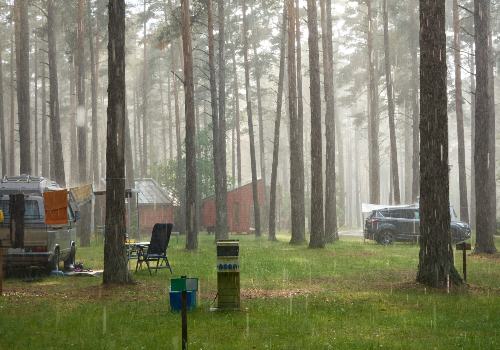
We know weather can be very unpredictable, and even when a tornado warning leads to no damage in your area, that doesn’t mean you can dismiss serious weather threats when you RV.
Yes, closing up your awning, pulling in slides, and putting away camp chairs and the grill only for bad weather to skirt your location can be very frustrating. Moving your RV to a safe place can put a big dent in your camping or vacation time.
But, it only takes letting down your guard once to receive a direct hit that can total your RV and injure or even kill occupants. So, never assume “it won’t be that bad” and instead prepare for the worst and be grateful if you come out okay.
Recognize Signs a Tornado Can Form
Suppose you keep a close eye on the horizon, listen for strange sounds, and pay attention to any eerie feeling in the air. In that case, you can often sense severe weather and potential tornadoes approaching before you get an official alert.
Here are unique things to look out for that indicate a tornado is coming:
- Grey or green colored clouds forming
- Clouds that cover the sky and look like popcorn underneath
- A strange calmness and silence in the air (common before the weather front arrives)
- Large hail
- Intense lightening
- A “wall” of dark clouds approaching
- Clouds that appear to rotate
- Clouds that form a short or full funnel to the ground
- Loud roaring noise, similar to the sounds of a freight train
- Static or electrical feel to the air
- Rotating dust clouds
If you spot any of these things, please start preparations to shelter from the storm.
Are Motorhomes Safer than Travel Trailers in Bad Weather?
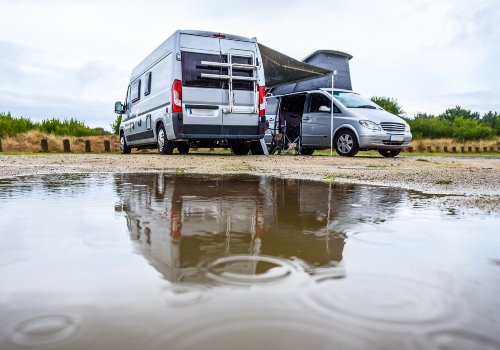
Motorhomes are much heavier than travel trailers and fifth wheels, making them harder to tip over under high winds. Many Class A motorcoaches are very high quality, with durable materials, rugged construction techniques, and aerodynamic exteriors that could help buffer the effects of high winds.
However, no RV will withstand the force of a tornado, so you’ll need to evacuate and find a safer place to shelter.
Before a storm arrives and you find a safe place to ride out the storm, it’s best to turn your camper so the front faces the wind head-on. The smaller surface area of the RV front will lower the chances of wind pushing the travel trailer or motorhome over versus having the wind hit the larger RV sides.
With RV construction materials so lightweight and often poor quality put into the build, a tornado will blow a camper to pieces, or high winds will topple over a row of closely parked RVs like dominoes.
Want to Connect With a Community of Over 1,078 RV Enthusiasts?
It is possible to gain some protection from a tornado if you can park your RV in a well-built carport or building or pull up next to a tall cement wall that can break the wind, but there is no guarantee it will keep you from harm.
Should You Stay in Your RV During a Tornado?
Unless you’re caught totally off-guard by a tornado and so much debris is flying around outside your RV that you cannot reach a safer shelter, staying inside may be your only choice.
Here are things you should do to prepare to ride out the storm:
- Bring in slideouts
- If possible, fill your freshwater and waste tanks to add weight and stability
- Hitch up a travel trailer or fifth wheel to the tow vehicle
- Turn off all propane appliances
- Unplug from shore power or turn off the main breaker
- Close windows, pull down shades and shut curtains
- Find an area with the most walls or solid furniture, such as next to kitchen cabinets or inside a bathroom
- Pull mattresses and blankets off beds and place them over occupants to protect against falling or flying debris
What to Do When Leaving Your RV During a Tornado
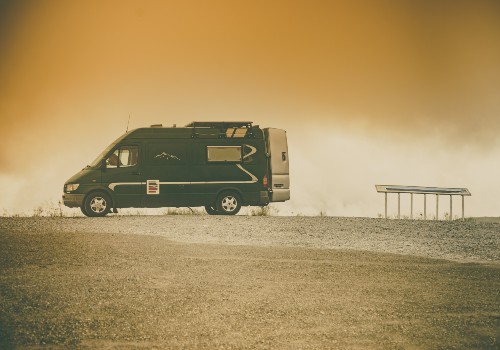
If you have enough warning of an approaching tornado and can reach a safe shelter, do so immediately.
If the storm is already underway, watch out for the following:
- Downed power lines (stay far away if you see any)
- Leaning trees and falling branches (try not to walk underneath)
- Flooding or rushing water (do not wade through unless necessary)
These same cautions apply after the tornado passes, along with watching for nails and other sharp objects protruding from building materials strewn on the ground.
If you’re out in the open without a solid structure to hide, one thing to avoid is getting inside large storm drains or culverts under roads. While they provide protection underground, they can also quickly fill with water, leading to drowning or being washed downstream.
The best solution is to find a ditch or low patch in the ground and hunker down so flying debris can pass over you.
Should You Drive Away From a Tornado?
If you have enough warning and can plot a safe escape route to drive your RV out of harm’s way, moving your camper out of the storm’s path is acceptable. However, even “clear” regions you can see on radar surrounding a storm can have high winds that could pose a danger when trying to escape.
Unfortunately, most storms that harbor tornadic activity are massive and move very fast, making it difficult to drive away safely. So don’t take a chance if it’s going to be a close call; you’re better off finding a safe place to park your RV and get to a designated tornado shelter.
Final Thoughts
Most RVers go their entire lives never dealing with an encounter with a tornado, but severe weather with high winds is always a threat no matter where you travel.
Just as you prepare on RV trips for things like breakdowns, flat tires, broken appliances, leaky pipes, or medical emergencies, having a tornado safety plan ready is another way to ensure your RV trips go as smoothly as possible.
Don’t let the threat of bad weather or a tornado ruin your RVing adventures. Instead, be proactive and have a plan to remain safe ahead of any storm!
Surviving Tornado and Severe Weather in an RV (Video)
"Man cannot discover new oceans unless he has the courage to lose sight of the shore."
-- Andre Gide

